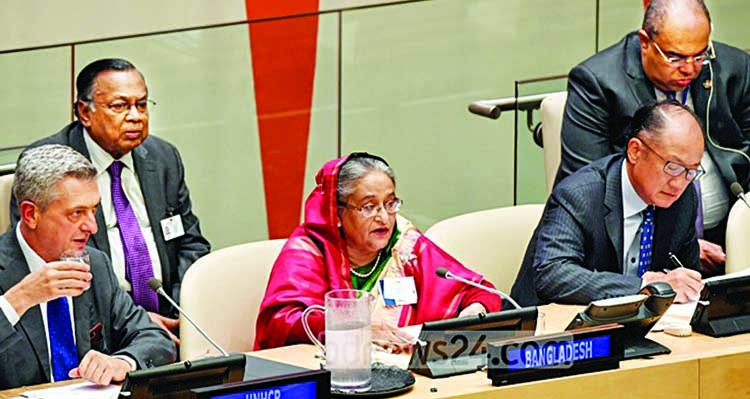Published: 03:50 AM, 25 September 2018
PM's 3 points to end Rohingya crisis
 Prime Minister Sheikh Hasina attended a high-level event on refugees at the UN Headquarters in New York yesterday. -PID
Prime Minister Sheikh Hasina attended a high-level event on refugees at the UN Headquarters in New York yesterday. -PID Prime Minister Sheikh Hasina has placed three recommendations that include abolishment of discriminatory laws, policies and practices against the Rohingya people in Myanmar to end the refugee crisis.
She has also reiterated her call for creating an atmosphere conducive to giving citizenship to all Rohingyas and ensuring justice and accountability in light of the UN fact-finding mission's report.
She placed the recommendations at the 'High-level Event on the Global Compact on Refugees: A Model for Greater Solidarity and Coopera-tion' organized by UN High Commissioner for Refugees Filippo Grandi at the UN Headquarters in New York yesterday, reports bdnews24.com.
Bangladesh is facing the largest forced movement in the shortest time of over 1.1 million traumatised Rohingyas who have been forcibly displaced from their homes in Rakhine State of Myanmar where they had been living for centuries, she said.
"While we are providing them with basic necessities, the magnitude of the problem has posed serious challenges for us," the prime minister said. She told the event that her government had allocated over 6,000 acres of land for the refugees.
Diversion of human and other resources for Rohingyas has taken toll on society, environment and economy of Bangla-desh, she said.
The international partners, especially the UN agencies, have been helping the Rohingyas, but "regrettably the current UN joint response plan of 2018 which requires $950 million has remained severely underfunded with only 33 percent funding secured", Hasina said.
"Humanitarian and development support of the international community for the Rohingyas and other affected communities must be predictable and in the spirit of international responsibility sharing," the prime minister said.
The three recommendations she placed to solve the Rohingya crisis are:
* First, Myanmar must abolish discriminatory laws, policies and practices against Rohingyas and address the root causes of forced displacement in a genuine and timely manner.
* Second, Myanmar must create a conducive environment by building trust and guaranteeing protection, rights and pathway to citizenship for all Rohingyas. If needed, create a "safe zone" inside Myanmar to protect all civilians.
* Third, prevent atrocity crimes against Rohingyas in Myanmar by bringing accountability and justice, particularly in light of the recommendations of the Fact-Finding Mission of the UN Human Rights Council.
The UN fact-finding mission in its report released on September 18 said Myanmar's democratic transition grounded to a standstill as authorities seek to silence critics while allowing hate speech, particularly against the Rohingyas.
In a summary submitted to the UNHCR on August 27, the panel said Myanmar's military carried out mass killings and gang rapes of Rohingya with "genocidal intent" and called for commander-in-chief Min Aung Hlaing and five generals to be prosecuted for the gravest crimes under international law.
Hasina, in her speech at the event in New York, reiterated that since the Rohingya crisis had originated in Myanmar, its solution has to be found in that country.She emphasized return of the Rohingyas to their homes in safety, security and dignity.
The prime minister told her audience that her government, given the scarcity of land and other socio-cultural and environmental impacts of the Rohingya crisis, was developing an island called Bhasan Char where the refugees will have better living conditions and livelihood opportunities.
"In the absence of any policy of local integration in Bangladesh, Rohingyas need to secure their future in their own country Myanmar," she added and reiterated the call for the international community to help Bangladesh send the Rohingyas back.




